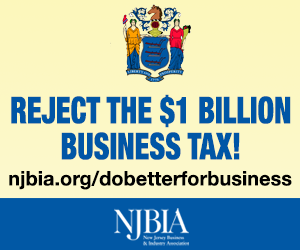Sierra Club: EPA Weakens Clean Air Rules; Report Shows NJ Air Worsening
EPA Weakens Clean Air Rules; Report Shows NJ Air Worsening
The American Lung Association released a report stating that New Jersey continues to have some of the most polluted air in the entire nation. This comes at the same time that the EPA is allowing certain facilities to be subject to less-stringent regulations and is letting companies use friendlier math in calculating their expected emissions. Environmentalists and public health advocates say the memos could greatly increase levels of air pollutants like mercury, benzene and nitrogen oxides.
“The new report shows that New Jersey’s air continues to be among the most polluted in the nation. At the same time, the Trump is making the situation worse with their continued rollback of clean air regulations. Trump has sided with corporate polluters instead of protecting the health of the public and the environment. By weakening air regulations, it will allow polluters across the country to stop meeting crucial requirements under the Clean Air Act. These regulations are important to protect our lungs and our communities and it is shameful that the Trump Administration is siding with polluters by weakening them,” said Jeff Tittel, Director of the New Jersey Sierra Club. “Trump’s attacks on clean air hit New Jersey right in the lungs.”
The first memo, issued in December, states that the EPA will no longer “second guess” companies’ calculations of their expected pollution output after certain big projects under what is known as New Source Review. The second memo, issued in January, repeals a Clinton-era policy known as “once in, always in.” Under the previous policy, facilities could never be considered “minor” sources of hazardous pollution if they were already considered “major” sources, and subject to much stricter rules. The third memo allows companies to use a procedure known as “project netting” when applying for permits for major projects under the New Source Review program.
“For decades, polluters have been able to meet this Clean Air Act requirement, and the administration’s decision to grant them this toxic loophole is as heartless as it is reckless. Polluters will be able to save more while emitting more harmful pollutants. The public health and environment will pay the price,” said Jeff Tittel.
According to the American Lung Association report, eleven counties in the state received a failing grade with four other counties receiving a C or D and the rest unable to be determined. The report also identified the most at-risk groups including those with asthma and lung cancer. It also laid out the number of high-ozone days in each county over the last few years. Climate change creates higher ozone levels, leading to worsened air quality and increased health effects.
“This report is an alarm bell going off because New Jersey still has some of the worst air quality in the country. Not only are we dealing with the lasting effects of the last eight years under Governor Christie, but we now have to deal with national threats to our air as well. Trump’s anti-environmental and anti-clean air actions have directly threatened our air quality. Here in New Jersey, we’ll see a bigger impact to public health and our lungs because of all the pollution that comes in from out of state,” said Jeff Tittel.
North Jersey ranked as the 10th worst metropolitan area in the U.S. for ozone levels, the main ingredient in smog that can trigger asthma attacks in the estimated 650,000 state residents who suffer from the disease. In New Jersey, air pollution has led to asthma in children and adults, chronic obstructive pulmonary disease, and lung cancer. Health problems will get worse as President Trump moves toward weakening clean air standards in an effort to boost the nation’s manufacturing sector.
“Ground level ozone is one of the worst air pollutants with one of the sources being car emissions. Air pollution can cause asthma attacks and put people with heart problems, lung problems or children at risk. Ozone not only has significant health impacts, but it is an irritant for people at risk it which can actually cause asthma attacks sending people to the hospitals. It is also linked to premature death through heart attacks or asthma attacks,” said Jeff Tittel.
Carbon pollution is the main contributor to climate change and leading cause of breathing problems in New Jersey. Under the Obama Administration’s Clean Power Plan, the U.S would cut carbon emissions from power plants by 32% from the 2005 levels. The Clean Power Plan would help avoid 3,600 premature deaths, 90,000 asthma attacks in children and deliver total health benefits of $14 billion to $34 billion in 2030 to the American people.
“The repeal of the Clean Power Plan was, and is still, a direct assault on New Jersey’s clean air, directly affecting our lungs. It also hurts our economy and puts a burden on New Jersey businesses and citizens. Our businesses may have to work harder to meet reduction standards because of the impact of out-of-state air pollution. The CPP also would help establish green jobs. Clean air is an essential part of a healthy economy. It will not only reduce health costs and sick days for the residents of New Jersey, but investing in renewable will create jobs and protect our environment,” said Jeff Tittel.
President Trump is rolling back federal tailpipe regulations under the CAFE standard set by the Obama Administration. These standards would have reduced climate pollution by as much as 6 billion metric tons over the lifetimes of the vehicles sold in model years 2012-2025—the equivalent to carbon pollution from 150 typical coal-fired power plants for an entire year.
“The weakening of vehicle efficiency standards will directly impact public health in New Jersey. For a state like New Jersey, these changes will hit us right where we believe because cars and trucks are the biggest sources of air pollution. While New Jerseyans spend more money at the pump, we will see more asthma and respiratory problems,” said Jeff Tittel.
The one positive portion of the report shows that soot in New Jersey’s air continues to decline. This is most likely due to the replacing of old diesel engines and closing of coal-fired power plants. Last year the two remaining major coal plants in the state were shut down by PSEG: the Mercer Generating Station and the Hudson Generating Station.
“Coal is expensive and dirty and that’s why it’s good that we’re getting rid of these plants. Despite these New Jersey’s coal plants considered state-of-the-art, they still pollute too much and are expensive to operate. This is why we need to transition to renewable energy and keep closing coal plants. We should work to replace these plants with renewable energy instead of more dirty fossil fuel such as natural gas. We are glad PSE&G’s coal plants are closing because the Christie Administration has prevented us from moving forward with clean energy,” said Jeff Tittel.
In New Jersey we can do more to reduce air pollution. This includes reentering New Jersey in the Regional Greenhouse Gas Initiative (RGGI) in a timely fashion as well as the US Climate Alliance. We can work towards transitioning to 100% renewable energy by 2050 which would reduce the amount of fossil fuels releasing greenhouse gasses. We can electrify our state by encouraging more EVs and less diesel-powered automobiles.
“We need to do more in our state to reduce air pollution and protect ourselves from the environmental rollbacks of the Trump Administration that worsen our air quality and lead to more health effects. Clean air is an essential part of a healthy economy. Reducing air pollution will not only reduce health costs and sick days for the residents of New Jersey but investing in renewable will create jobs and protect our environment,” said Jeff Tittel, Director of the New Jersey Sierra Club.








